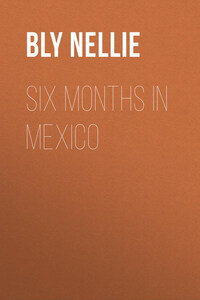CHAPTER I.
ADIEU TO THE UNITED STATES
One wintry night I bade my few journalistic friends adieu, and, accompanied by my mother, started on my way to Mexico. Only a few months previous I had become a newspaper woman. I was too impatient to work along at the usual duties assigned women on newspapers, so I conceived the idea of going away as a correspondent.
Three days after leaving Pittsburgh we awoke one morning to find ourselves in the lap of summer. For a moment it seemed a dream. When the porter had made up our bunks the evening previous, the surrounding country had been covered with a snowy blanket. When we awoke the trees were in leaf and the balmy breeze mocked our wraps.
Three days, from dawn until dark, we sat at the end of the car inhaling the perfume of the flowers and enjoying the glorious Western sights so rich in originality. For the first time I saw women plowing while their lords and masters sat on a fence smoking. I never longed for anything so much as I did to shove those lazy fellows off.
After we got further south they had no fences. I was glad of it, because they do not look well ornamented with lazy men.
The land was so beautiful. We gazed in wonder on the cotton-fields, which looked, when moved by the breezes, like huge, foaming breakers in their mad rush for the shore. And the cowboys! I shall never forget the first real, live cowboy I saw on the plains. The train was moving at a "putting-in-time" pace, as we came up to two horsemen. They wore immense sombreros, huge spurs, and had lassos hanging to the side of their saddles. I knew they were cowboys, so, jerking off a red scarf I waved it to them.
I was not quite sure how they would respond. From the thrilling and wicked stories I had read, I fancied they might begin shooting at me as quickly as anything else. However, I was surprised and delighted to see them lift their sombreros, in a manner not excelled by a New York exquisite, and urge their horses into a mad run after us.
Such a ride! The feet of the horses never seemed to touch the ground. By this time nearly all the passengers were watching the race between horse and steam. At last we gradually left them behind. I waved my scarf sadly in farewell, and they responded with their sombreros. I never felt as much reluctance for leaving a man behind as I did to leave those cowboys.
The people at the different stopping-places looked at us with as much enjoyment as we gazed on them. They were not in the least backward about asking questions or making remarks. One woman came up to me with a smile, and said:
"Good-mornin', missis; and why are you sittin' out thar, when thar is such a nice cabin to be in?"
She could not understand how I could prefer seeing the country to sitting in a Pullman.
I had imagined that the West was a land of beef and cream; I soon learned my mistake, much to my dismay. It was almost an impossibility to get aught else than salt meat, and cream was like the stars – out of reach.
It was with regret we learned just before retiring on the evening of our third day out from St. Louis, that morning would find us in El Paso. I cannot say what hour it was when the porter called us to dress, that the train would soon reach its destination. How I did wish I had remained at home, as I rubbed my eyes and tried to dress on my knees in the berth.
"It's so dark," said my mother, as she parted the curtains. "What shall we do when we arrive?"
"Well, I'm glad it's dark, because I won't have to button my boots or comb my hair," I replied, laughing to cheer her up.
I did not feel as cheerful as I talked when we left the train. It had been our home for three days, and now we were cast forth in a strange city in the dark. The train employés were running about with their lanterns on their arms, but no one paid any attention to the drowsy passengers.
There were no cabs or cabmen, or even wheelbarrows around, and the darkness prevented us from getting a view of our surroundings.
"This has taught me a lesson. I shall fall into the arms of the first man who mentions marry to me," I said to my mother as we wended our way through freight and baggage to the waiting-room, "then I will have some one to look after me."
She looked at me with a little doubting smile, and gave my arm a reassuring pressure.
I shall never forget the sight of that waiting-room. Men, women, and children, dogs and baggage, in one promiscuous mass. The dim light of an oil-lamp fell with dreary effect on the scene. Some were sleeping, lost for awhile to all the cares of life; some were eating; some were smoking, and a group of men were passing around a bottle occasionally as they dealt out a greasy pack of cards.
It was evident that we could not wait the glimpse of dawn 'mid these surroundings. With my mother's arm still tightly clasped in mine, we again sought the outer darkness. I saw a man with a lantern on his arm, and went to him and asked directions to a hotel. He replied that they were all closed at this hour, but if I could be satisfied with a second-class house, he would conduct us to where he lived. We were only too glad for any shelter, so without one thought of where he might take us, we followed the light of his lantern as he went ahead.








